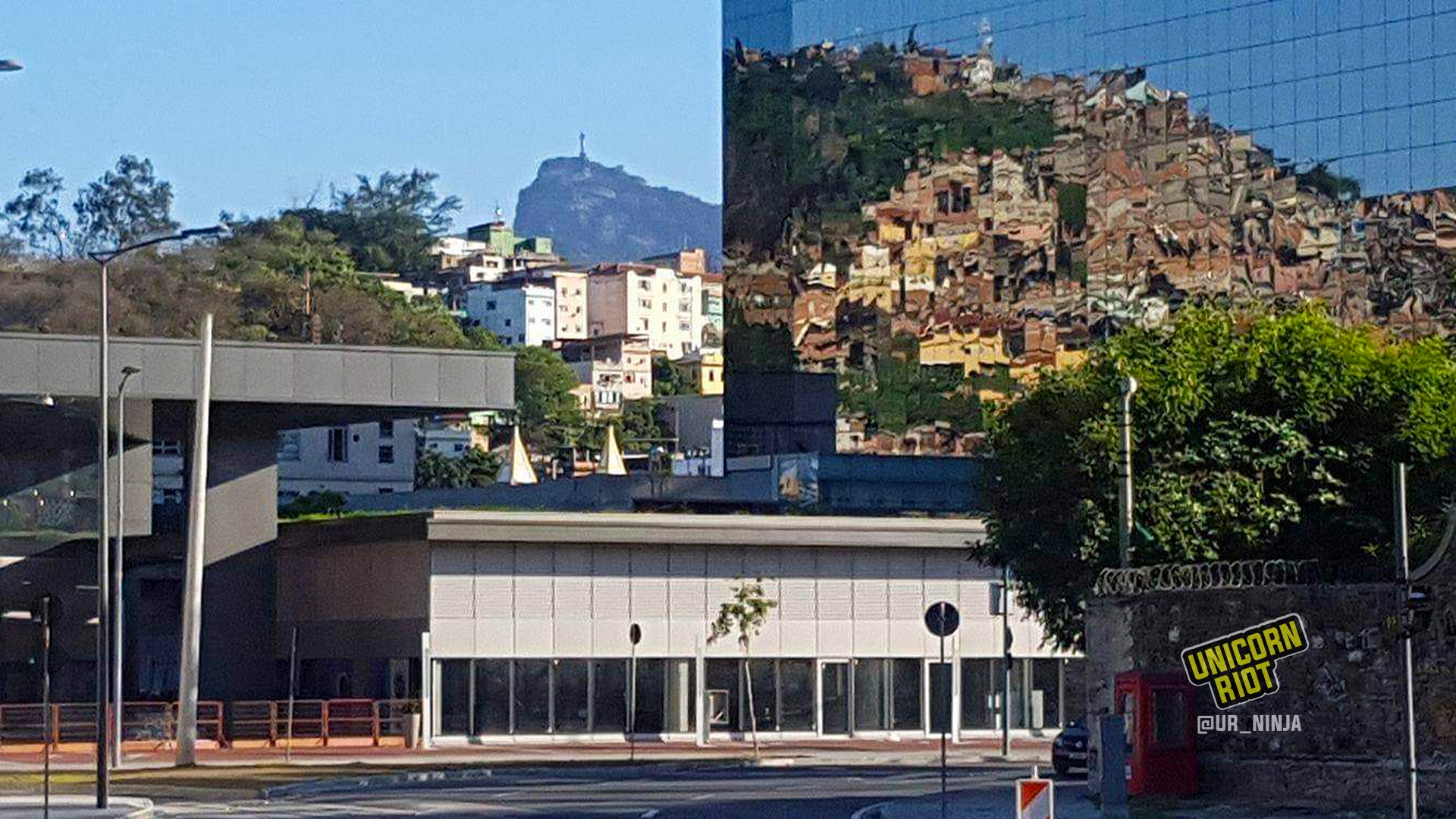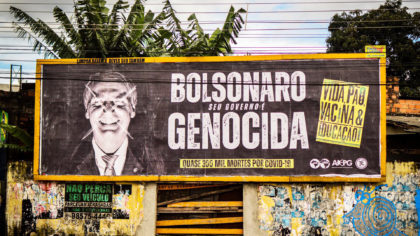“Brazil is Asking for Help” – Artists and Activists Speak Out
COVID-19 continues to ravage Brazil, leading to record numbers of daily deaths. For a deeper understanding of some of the impacts the coronavirus pandemic is having on several areas and aspects of life, Unicorn Riot recently heard from four Brazilians across different states.
Brazilian Pandemonium: COVID-19 Kills Over 300K
With skyrocketing death tolls and a total of over 340,000 coronavirus fatalities, the mismanagement of COVID-19 has taken its toll on the population of Brazil. From misinformation to denying the virus and denigrating those who’ve died during the pandemic, Brazil’s far-right President Jair Bolsonaro has been blamed for the shortage in vaccines and the widening public health calamity.
In small towns like Piúma, Espirito Santo, the health system is completely insufficient. Catarina Mais, a local health professional, spoke to Unicorn Riot about the ICU crisis in the state of Espírito Santo. Mais said the UK variant, the most aggressive COVID-19 variant, had just entered the town, likely from “a tourist from another state or county.” This could be devastating for Piúma, as the population doesn’t have enough hospital beds available. Mais said they can’t even count on an ambulance to transfer high-risk patients to better equipped hospitals.
She called out for help:
“Piúma is asking for help, the state of Espírito Santo is asking for help, Brazil is asking for help.”
Catarina Mais, licensed practical nurse, social and political activist.
An obvious reality of the pandemic is that the effects vary drastically from city-to-city, state-to-state, and country-to-country. In Brazil, the effects are accentuated by the stark contrast in social conditions. A large portion of the underprivileged population lives in close proximity to the wealthy, but has a completely different reality.
While violence can still be a problem for the financially stable, the people in the favelas and other peripheral areas of the cities endure drug faction wars and police violence.
In the state of São Paulo alone, a staggering total of 5,153 were killed by police from 2015 to 2020, with nearly a quarter of them being children and teenagers.
Similar statistics of police terror are recorded in Rio de Janeiro. From March 2020 until March 2021, there were 377 counted police actions in Rio, over one-a-day. This happened after August’s ruling by Brazil’s Supreme Federal Court (STF) suspending all police operations during the pandemic. The police never ceased their operations and Rio resident, Thainã de Meideiros, says the police keep “coming up with excuses” to violate the legislative order.
Meideiros lives in Complexo do Alemão, a large group of favelas in Rio de Janeiro where a recent military and police occupation of the favelas lasted a few years. Police violence is a constant in Complexo do Alemão. Just three months before STF ordered the suspension of police operations, 13 people were killed by police in one operation.
Meideiros is part of the Papo Reto Collective, which is a group focused on human rights, culture, harm reduction, health, education and communication in Complexo do Alemão. Meideiros told Unicorn Riot that not only have police raids not stopped, the favelas are now facing a serious water shortage.
“The police found ways to keep making these raids, always coming up with excuses, saying a patrol car was passing by and was shot at and they fired back. […] as if it wasn’t enough this pandemic situation where a lot of people are dying from it we also have water shortage and shootings inside the favelas. This week only in the Complexo do Alemão we had two shootings.”
Thainã de Meideiros, member of the collective “Papo Reto” in the Complexo do Alemão, Rio de Janeiro
While violence is a recurring issue for the most vulnerable populations of Brazilian society, the ineffective and contradicting COVID-19 countermeasures have been impacting the people.
Targeted by police and abandoned by the health system, the underprivileged continue to be economically neglected by the government. Financial aid was cut off and the lockdown measures and policies enacted to fight the pandemic, such as the work-from-home initiatives, made life virtually unsustainable.
For those living stacked up in the little edges and corners of countless Brazilian cities, isolation and quarantine is a privilege people usually can’t afford. This leads to workers risking their lives to make a paycheck.
From Porto Seguro, Bahia, rapper Celião told Unicorn Riot there’s no “effective sustenance for families and the population is searching for solutions.“
“We’re in a total state of vulnerability because those who dare to try to make a living are fought with repression policies.”
Célio Assis, rap singer and composer known as Celião
Distancing policies and curfews with no financial aid completely ignore the needs of the majority of the working class to get money to eat and pay for shelter.
In turn, mutual aid initiatives have become a backbone of support for the Brazilian people. Movements like “Serrão without Corona” which helped millions of families in the Aglomerado da Serra community of Belo Horizonte, Minas Gerais are the only support most people can count on.
“The favela’s helping the favela, because if it’s not us for us, nobody else will.“
DJ Pity, part of the biggest Baile Funk (favela Hip-Hop) in the Aglomerado da Serra community
“There’s a lot of hunger,” DJ Pity told Unicorn Riot. “We’re trying to bring awareness about staying home, but if people stay in, how can anyone eat? How can anyone live? So, I’m here to say that, man, like, the situation here in BH [Belo Horizonte] is awful.“
DJ Pity said they hoped that “everyone is vaccinated” by next year. Yet, the reality of mass vaccination is still far away. While the favelas and rural communities might have completely different cultures and experiences, they share the same governmental neglect and extremely risky living environments.
Unicorn Riot's Coverage From Brazil:
- ‘Marielle, Presente’ – March Marks Feminist Struggles in Brazil - April 13, 2023
- Over 100 Families Occupy Abandoned Apartment Complex in Brazil - February 20, 2023
- Bolsonarist Extremists Attack Brazilian Government a Week After Lula Inauguration - January 12, 2023
- Elder Woman Released After 27 Years of Slave-like Servitude in Brazil - January 5, 2023
- With Lula Elected President of Brazil, the Left Consolidates itself as a Power in South America - November 9, 2022
- Elections in Brazil: Second Round Slated for October 30 Between Lula and Bolsonaro - October 7, 2022
- Ribeirão Favel’Arte, Festival of Arts and Culture in Brazilian Favelas - September 7, 2022
- Indigenous Official and British Journalist Murdered in Brazilian Amazon - July 7, 2022
- ‘Bolsonaro Never Again’ Protests Come Among New Wave in Government Scandals - May 19, 2022
- COVID Commission Finds Bolsonaro Committed “Crimes Against Humanity” - December 15, 2021
- Brazil: 600K Deaths, Emergency Aid Ends, Protests Continue, & People Call for Lula 2022 - October 9, 2021
- Brazil: Mutual Aid During COVID-19 and Bolsonaro’s Mismanagement - September 19, 2021
- Police in Brazil Killed Record Amount of People in 2020 - September 8, 2021
- Are the “Fora Bolsonaro” Protests Enough? - August 26, 2021
- Brazil: Hoping for a Vaccine, Food on the Plate and #ForaBolsonaro - July 9, 2021
- Brazil: The People, at Last, Took to the Streets - June 3, 2021
- The Invisible “THEY” - Apr. 29, 2021
- “Brazil is Asking for Help” – Artists and Activists Speak Out - Apr. 10, 2021
- Brazilian Pandemonium: COVID-19 Kills Over 300K - Mar. 27, 2021
- Brazil Nears 200K Deaths as Politicians Continue to Downplay COVID-19 - Dec 20, 2020
- Echoes of George Floyd in Brazil: Man Kneeled On, Killed by Security Guard - Nov 23, 2020
- The Coronavirus Crisis in Brazil – An Interview with EmiciThug - May 22, 2020
- “Enough of Being the Blood that Promotes Fascists”: Viewpoints From Brazil - May 15, 2019
Below are the full translations of each of the four short testimonies.
- DJ PITY
Hey, Everyone! It’s me, DJ Pity, directly from Serrão, Minas Gerais – Belo Horizonte. Flávio [EmiciThug] invited me to talk a little about the Coronavirus situation in my community. Guys, the situation we’re living here is not a good situation, we’re on the purple wave, everything is closed, it’s lockdown, it’s curfew. But what’s the use if the governors don’t take action? They don’t look over the favelas, everything happening in here is made from and for the population. We’re doing food distribution, we’re helping our people in need. I was part of the first weeks of the “Serrão without Corona” project, where we helped millions of families here in the community because there’s a lot of people in need. There’s a lot of hunger, you know? We’re trying to bring awareness about staying home, but if people stay in, how can anyone eat? How can anyone live? So, I’m here to say that, man, like, the situation here in BH (Belo Horizonte) is awful. We’re waiting to get better, we’re awaiting the vaccine, but our government won’t do anything for us, we’re doing for ourselves. The favela’s helping the favela, because if it’s not us for us, nobody else will. So, guys, that’s what’s going on here, let’s bring awareness about what we’re trying to do here, I’m a cultural producer, I’m a part of the biggest Baile Funk in the Aglomerado da Serra community and right now it’s really hard for everyone and I hope that next year, or in the middle of this year, everyone is vaccinated. Thanks, everyone, peace!
- CATARINA MAIS
My name is Catarina Mais, I’m a licensed practical nurse and social and political activist. I live in the city of Piúma, in the state of Espírito Santo, Brazil. How’s the pandemic in Piúma? Today we have a very high coronavirus contagion rate and in this last week I received the sad news about the presence of the UK variant, the most severe and aggressive COVID-19 variant. Piúma is a touristic city and I believe that this variant got here with a tourist from another state or nearby county and since the city barriers were not closed, the contamination increased. Today, the city is in lockdown, everything is closed and we have a very high contamination risk. We don’t have mobile ICU, we don’t have a cutting edge hospital with an ICU, we don’t have ambulances to transfer high risk patients and now our state is in collapse because we’re lacking ICU beds. So Piúma is asking for help, the state of Espírito Santo is asking for help. Brazil is asking for help.
- THAINÃ
Thainã de Meideiros here, my collective is “Papo Reto” in the Complexo do Alemão (Rio de Janeiro) and during the pandemic the STF (Supremo Tribunal Federal, the Brazilian equivalent of the Supreme Court) ruled a decision making police operations on favelas forbidden, and in the first moment we had a huge drop in numbers of death, but that was soon disrespected. The police found ways to keep making these raids, always coming up with excuses, saying a patrol car was passing by, was shot and fired back. Those numbers started to grow again, so as if it wasn’t enough this pandemic situation where a lot of people are dying from it we also have water shortage and shootings inside the favelas. This week only in the Complexo do Alemão we had two shootings.
- CELIÃO
I’m Célio Assis, known as Celião, rapper and composer, born in Porto Seguro, Bahia. The COVID-19 situation in the peripheries keeps getting more precarious, we’re the most vulnerable population, both in getting contaminated and having complications that can lead to death as well as suffering the economic consequences caused by the virus. So, we’re in a total state of vulnerability because those who dare to try to make a living are fought with repression policies. We don’t have an aid that can really maintain an effective sustenance for families and the population is searching for solutions. We’re not getting a mass vaccination and what’s left for us is just waiting for the moment [of vaccination] and surviving anyway we can.
Cover image via Francisco Pereira. Video translation from Portuguese to English by Jules Rey.
Follow us on X (aka Twitter), Facebook, YouTube, Vimeo, Instagram, Mastodon, Threads, BlueSky and Patreon.
Unicorn Riot's COVID–19 Coverage:

- “Brazil is Asking for Help” – Artists and Activists Speak Out - April 10, 2021
- Brazilian Pandemonium: COVID-19 Kills Over 300K - March 27, 2021
- COVID-19 Deaths in Minnesota Prisons Continue to Rise - February 17, 2021
- Brazil Nears 200K Deaths as Politicians Continue to Downplay COVID-19 - December 20, 2020
- Winter of Coronavirus: Seeking Shelter in Minneapolis During COVID–19 - December 14, 2020
- Denver Sweeps 300+ Tent Encampment Residents - November 30, 2020
- Unhoused Community Forms Tenants Union, Constituents Protest at Commissioner’s Home - November 11, 2020
- Minneapolis Prioritizing Park Sweeps Over Sheltering the Unhoused - October 29, 2020
- Court Protest Aims at Boston Covid Housing Crisis - October 29, 2020
- Philly Starbucks Worker Delivers NLRB Unfair Labor Practice Complaint - October 15, 2020
- Demands Reignite for Releases from GEO ICE Jail Amid New Covid Outbreak - October 5, 2020
- Peavey Park Sanctuary Homeless Camp Evicted in Minneapolis - September 24, 2020
- New Month Brings Added Urgency To Minneapolis’ Housing Needs - September 2, 2020
- COVID–19 Testing DeMystified at Community-Informed Coronavirus Testing Site - August 29, 2020
- Sanctuary Camp Residents Pressured to Move, No Housing Solution In Sight - August 22, 2020
- Coronavirus, Corruption, and Resistance: Life Under South Africa’s Lockdown - August 17, 2020
- Authorities Visit Loring Park Tent Encampment, Bring Eviction Scare - August 10, 2020
- Minneapolis Park Police Displace Sanctuary Encampment - July 22, 2020
- Homeless Philadelphians Moving Into Vacant City-Owned Homes - June 22, 2020
- Encampment to ‘Free Them All’ Outside GEO ICE Detention Center - May 26, 2020
- The Coronavirus Crisis in Brazil – An Interview with EmiciThug - May 22, 2020
- Nurses Picket Over Lack of Protection From Ongoing Viral Pandemic - May 21, 2020
- Mutual Aid to Detained Refugee Women Grows — Coronavirus in Greece Part 3 - May 7, 2020
- Minneapolis May Day Protest Supports Essential Workers - May 2, 2020
- MN Demonstrations, Demands to Free Prisoners Escalate - April 30, 2020
- Denver ‘Clean-ups’ Displace 100+ Unhoused Residents Amid Health Crisis - April 30, 2020
- Worker-Occupied Factory Sends Soap to Refugee Camp – Coronavirus in Greece, Part 2 - April 28, 2020
- A Country Quarantined, Coronavirus in Greece Part 1 - April 25, 2020
- Who’s Calling to ‘Liberate Minnesota’, and Why? - April 21, 2020
- Living with COVID–19 - April 17, 2020
- Philly Mayor and Judges Pressured To Release Inmates From Jail - April 15, 2020
- Calls for Rent and Mortgage Freeze Outside MN Legislature - April 14, 2020
- What Is Coronavirus and How Do Humans Defeat It? - April 10, 2020
- Car Protest Demands Philadelphia Officials Release Prisoners To Save Lives In Pandemic Crisis - April 10, 2020
- ‘Cancel Rent’ Demo Calls for a Rent and Mortgage Payment Freeze as COVID-19 Spreads - April 9, 2020
- Coronavirus in the Caribbean: COVID–19 Update from Puerto Rico - April 2, 2020
- ‘Never Again’ Demo Demands Release of Detainees Amidst COVID–19 Pandemic - March 30, 2020
- South Africa Under Lockdown as COVID–19 Spreads - March 29, 2020
- Providing Mutual Aid Amidst the Coronavirus Pandemic in Minnesota’s Twin Cities - March 27, 2020
- As U.S. Coronavirus Cases Top the World Charts, Minnesotans’ “Stay at Home” Order Goes Into Effect - March 27, 2020
- “Everyone Deserves A Cost-Of-Living Adjustment”: Interview with UCSC Striker Yulia Gilich - March 26, 2020
- ‘Real boog hours’: Neo-Nazi Terror and the Coronavirus Crisis - March 20, 2020
- Coronavirus Concerns End St. Paul Educators Strike, Close Many Public Schools - March 14, 2020
Please consider a tax-deductible donation to help sustain our horizontally-organized, non-profit media organization:



